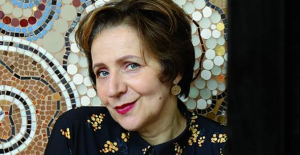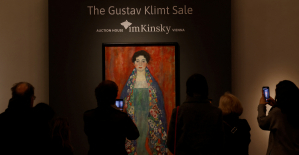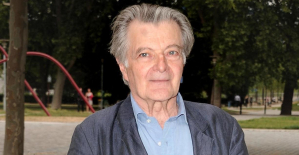Within sight of the skyline of high-rise buildings, the old town bazaar in the Suk Wakif is a place that is reminiscent of traditional Qatar like no other. Not far from Doha's harbor promenade, the scent of fine smoked wood permeates the winding streets. The maze of shops attracts tourists and locals alike.
At the edge of the Souk Wakif lies the Falcon Bazaar. The sellers and their birds of prey are waiting for potential buyers in air-conditioned rooms. They often pay as much for the Falcon as for a high-quality new car.
"Our grandfathers needed them to survive," says Tamim al-Kaabi on a hot summer's day. While the birds of prey used to be used for hunting, today falconry is a hobby that often serves prestige. Al-Kaabi also operates it. "TV shows with falcons in particular are popular with young people," says the 26-year-old.
During the fall and winter falconry season, when mild weather prevails in the Gulf, Qataris compete. For example, who owns the most beautiful or fastest bird of prey. Al-Kaabi's falcon has already won a prize.
Just like the city, sport is experiencing a transition to modernity. At a hospital in Souk Wakif that specializes in falcons, veterinarians treat digestive problems or injuries to the magnificent animals that their owners obviously care deeply about.
For Al Kaabi, a bank clerk, falconry is a family affair. "My uncle taught me how to live with hawks and how to deal with them." However, in summer the hawks rest in air-conditioned rooms. "It's way too hot for them outside."
For the residents of Qatar, heat and temperatures above 40 degrees are part of everyday life. Locals therefore like to spend the difficult summer months in cooler regions abroad. The fact that a Central European made his way to the desert state in midsummer always causes the interviewees to shake their heads. It was not without reason that the World Cup was postponed to the mild winter months. The ball will start rolling on November 20th.
As in many countries in the Arab world, mobile air conditioners are widely used outdoors in Qatar, which are placed next to the tables in restaurants and cafes and donate cool air - the counterpart to our patio heaters.
In the cultural village of Katara on the north coast of Doha, air conditioning systems have even been installed in the street on the promenade, cooling the open-air neoclassical resort. Nobody here is worried about wasting energy. Trips with the former wooden ships of the pearl divers, the so-called dhows, in the bay are likely to be a little more climate-friendly - there is always a refreshing breeze here.
On the other hand, the hip Muschairib district just off the Old Town district is a good example of how smart urban planning can help people cope with the summer heat. The modern buildings in the traditional style, for example, are designed in such a way that pedestrians in the district can walk in the shade at all times.
In addition, the architects designed the area so that air currents between the houses provide a breeze. An air-conditioned tram runs through the quarter with its museums and fine-looking restaurants.
Before oil was discovered in Qatar in 1939, the country lived off the pearl trade. The economy had largely collapsed with the advent of Japanese cultured pearls in the 1930s. Qatar experienced difficult years that have remained in the country's collective memory. The development of the first oil deposits brought an upswing from the middle of the 20th century, and huge natural gas fields finally helped the emirate to its current level of prosperity.
But the Gulf State also owes its rapid rise to the millions of South Asian guest workers who are everywhere in everyday life, whether in the construction industry, in taxis, in hotel lobbies or in restaurants. Currently, only about every tenth resident of the absolute monarchy has Qatari citizenship. The emirate is repeatedly criticized for systematic human rights violations and the exploitation of migrants. The government denies the allegations and is leading reforms.
"There has been an improvement," says Boris Mijatovic (Greens) from the Committee on Human Rights in the Bundestag. In the WELT interview, he comments on the discussion about human rights in Qatar. These have come into focus because of the upcoming World Cup.
Source: WORLD
Just a few months before the start of the soccer World Cup, construction was going on everywhere. Visitors can watch Doha grow. The many construction sites in the city designed for cars often force taxi drivers to detour.
Those who like to walk are best off in trendy districts such as Muschairib, at the bazaar or on the harbor promenades along the bay. In other places, however, one often searches in vain for footpaths. Longer distances are therefore covered by taxi or subway, whose futuristically designed stops are reminiscent of scenes from science fiction films.
The impression quickly arises that Qatar's ruling family is thinking big when it comes to the numerous construction projects. This is certainly not only due to the World Cup. Doha apparently also wants to compete with other metropolises on the Persian Gulf, such as Dubai.
Some see the compact size of the small emirate as an advantage, not just for the World Cup. Whether culture, water sports or trips to the desert - "Qatar offers the best of the Middle East in a compact form," says Berthold Trenkel, head of the tourism authority. According to the German manager, a particular advantage is the good international connection to the capital's airport. Hamad Airport is the hub of the national carrier Qatar Airways.
The districts on the artificial island The Pearl ("The Pearl") in the north of the capital are worth seeing. In addition to anchorages for yachts of all sizes, nightlife areas, villas and luxury skyscrapers have been built, which are intended to attract high earners in particular.
The architecture breaks with the traditional style here, many quarters are modeled on European cities. So there is a Venetian-style quarter. If you can afford it, go to one of the upscale restaurants on the island, where a main course can quickly cost the equivalent of 25 euros. Numerous sales areas of well-known sports car brands are reminiscent of the affluent target group of the "Pearl".
Anyone looking for bars or pubs on the artificial island in the neon light after dark will probably be disappointed. "We're not known for our nightlife," agrees Trenkel. "So if that's what you're looking for, Qatar is probably not the best destination."
Alcohol is only sold in Qatar in licensed places, there is none in the supermarket. You are most likely to find what you are looking for in four or five star hotels, but not everywhere. On the Altstadtmarkt, for example, the luxury hotels have decided against it - here, too, a sense of tradition has priority.
"We still have a very proud population that cares about history and heritage," says tourism manager Trenkel. Qatar's sense of history strikes visitors from almost every corner, from the must-see National Museum to the Museum of Islamic Art, which reopened in early October after a refurbishment.
Anyone traveling to the country should be aware: "It's an Islamic culture, it's a conservative country, and that involves things like the dress code," says Trenkel. "You don't run around in inappropriate clothing." What that means in practice is shown, for example, by a "traffic sign" at a water sports provider: Bikinis are forbidden. One should also be extremely cautious in public when it comes to the exchange of tenderness, which in the Islamic world belongs in the private sphere.
Especially in the context of the World Cup, the question of how open the country is to lesbian, gay, bisexual, transgender and intergender people is repeatedly raised. Homosexuality is forbidden by law and is officially punishable by up to seven years in prison. In recent years, however, no more judgments have been carried out. Here, too, the primary concern is not to exchange tenderness in public. However, Amnesty International found that women and lesbian, gay, bisexual, transgender and intersex (LGBTQI) people in Qatar “continue to be discriminated against both in law and in everyday life”.
Meanwhile, the world football association Fifa and the Emir of Qatar have repeatedly emphasized that all fans are welcome at the World Cup - regardless of their sexual orientation.
Qatar's will to promote tradition and historical awareness does not mean rejecting progress. An example of this is the "Education City" in western Doha, where a stadium and the futuristic national library are housed in addition to a large campus with internationally oriented chairs.
Surrounded by green areas that are otherwise rarely seen in the arid metropolis, there are prestige buildings here, for which mostly international star architects were commissioned. These projects are praised in many discussions, their goal should be to create an innovation center in the region.
You hardly hear any self-criticism – not even when it comes to building a golf course in the middle of the desert.
Away from the metropolis there are a few manageable activities such as water sports, desert safaris or camel riding. Those who prefer to be meditative can go kayaking in the northern mangrove forests and enjoy the pleasant peace and quiet in the biotope next to the chirping of birds. The tour there is a bit cumbersome by taxi. It is most likely to be managed with a rental car if you do not want to be plagued by sand in your shoes and mosquitoes in the evening.
A trip to al-Subarah on Qatar's northern tip, the country's only Unesco World Heritage Site, is a little disappointing. The restored fort was the center of the pearl trade in the late 18th century. However, it looks more impressive and larger on photos than in reality. The one-hour trip from Doha is probably worthwhile, especially for visitors interested in history.
A trip to the south of the country promises a touch of adventure. After you have passed the kilometer-long stretch of coast with the facilities of the oil and gas industry, numerous organizers offer trips through the dune landscapes, whether with an off-road vehicle or quad. Excursions to the Khaur al-Udaid, an inland sea in the south on the border with Saudi Arabia, are also popular.
Tamim al-Kaabi appreciates trips to the desert. Like their Bedouin ancestors, the men often camp there overnight with their hunting birds. "Without a cell phone," says al-Kaabi with a smile.
Football World Cup: The tournament starts on November 20th, the final is on December 18th. The fixed point of the World Cup is Doha, many stadiums are also located in the planned city of Al-Rayyan. The furthest away is the stadium in the city of al-Khour - about 50 kilometers north of Doha. FIFA World Cup information: fifa.com/fifaplus/de/tournaments/mens/worldcup/qatar2022
Arrival: There are direct flights to Doha from several German airports.
Entry: Normally tourists only need a passport valid for at least six months for their trip to Qatar. When they arrive at the airport, they will then receive a visa waiver free of charge, which allows them to stay in the country for up to 90 days at a time.
But everything is different around the World Cup: Since November 1st and until December 23rd, entry is only possible with the so-called Hayya Card. Only holders of World Cup match tickets can register for this "Fan ID", as the organizers call it. Ticket holders can then nominate up to three people who will receive a Hayya card even without a ticket and can thus enter the country (even later than the ticket holder). However, a fee of around 140 euros (500 Qatari riyals) is due for everyone over the age of 12.
Hayya Card holders no longer have to register in advance via the Qatar government's "Ehteraz portal", which was previously mandatory for holidaymakers. "Ehteraz", the Qatari corona tracking app, can also be installed for travelers during the World Cup, according to the Federal Foreign Office. However, you will only need it to visit health facilities. To be able to use the app, you need an international SIM card that also enables mobile internet use in Qatar – or you can get a Qatari SIM card at the airport, for example.
Proof of vaccination against Covid-19 is not required. And proof of a negative corona test has also no longer been required for travelers since November 1st. The Federal Foreign Office and the Qatari Ministry of Health provide further information on its website.
The Hayya Card: Before and during the World Cup, it is not only the entry ticket to Qatar, but must also be presented with the ticket if you want to enter the stadium. With it you can also use public transport in Qatar for free.
Anyone traveling to Qatar for the World Cup should apply for the Hayya Card in good time. According to the organizers, it takes five calendar days to obtain provisional approval after examining the photo and copy of the passport. It may take an additional 24 hours for the property to be confirmed. You also have to specify this in order to receive the card.
Important to know: Whoever gets the Hayya-Card approved will also receive an entry permit by e-mail. You have to have them ready at the airport – digitally or printed out. The Hayya card, in turn, can be shown on the “Hayya to Qatar 2022” app on the smartphone. You can also have them printed out once in two places in Qatar: The two Hayya service centers are the Ali Bin Hamad Al Attiyah Arena (ABHA Arena) and the Doha Exhibition and Convention Center (DECC).
If you only fly to Qatar for one game because you have your hotel in the United Arab Emirates, for example, you have to apply for a so-called “matchday visit” via the Hayya portal. This allows you to stay in Qatar for up to 24 hours. Answers to many other questions about the "Fan ID" can be found on the Qatar World Cup portal hayya.qatar2022.qa.
You should also know that the two smartphone apps Hayya and Ehteraz cause great concern among experts because they can deeply invade the privacy of users with their required permissions.
Rules in the country: Dress codes, such as wearing a headscarf, do not apply to foreigners in Qatar. However, the Foreign Office advises you not to dress too revealingly.
When it comes to the exchange of affection, which belongs in the private sphere in the Islamic world, one should also be extremely cautious in public.
Homosexuality is forbidden by law, but all fans should be welcome during the World Cup, as emphasized by the world association Fifa and the Emir of Qatar. Non-marital sex is also forbidden. However, according to the tourism board, no hotel will ask for a marriage certificate. Travel is considered a private matter. The official WM portal also says on the question of whether unmarried couples (including LGBTQI ) are allowed to stay in the same room: Yes, there are no restrictions.
Alcohol is heavily restricted in Qatar - primarily in bars and restaurants of certain licensed hotels. But there are exceptions around the World Cup. Alcoholic beverages will be served before and after kick-off on stadium grounds and after 18:30 local time at Doha Fanfest. Only non-alcoholic beer is served in the stadiums.
The Federal Foreign Office makes it clear: drunkenness and the consumption of alcohol in public are prohibited, as is the import of alcohol into the country. You must be at least 21 years old to drink alcohol in Qatar.
World Cup host Qatar has presented its new metro to the public. The network connecting the airport with downtown Doha and the World Cup venues was planned and fully implemented in a record seven years.
Source: SID
Transportation: There is a three-line metro system in Doha. One of the metros connects Hamad Airport with downtown. According to the Foreign Office, regular bus lines are unreliable and not recommended. Otherwise, the means of transport of choice are primarily taxis, limousine services or rental cars.
Safety: The crime rate is low, it is a safe country. Caution is advised when driving. Wherever the roads allow it, people often drive very quickly and often in a risky manner.
Temperatures: It can get very hot in summer. It is more pleasant in the winter months. In November and December, for example, the daytime temperatures are between 25 and 30 degrees.
Information: visitqatar.qa/de-de

 His body naturally produces alcohol, he is acquitted after a drunk driving conviction
His body naturally produces alcohol, he is acquitted after a drunk driving conviction Who is David Pecker, the first key witness in Donald Trump's trial?
Who is David Pecker, the first key witness in Donald Trump's trial? What does the law on the expulsion of migrants to Rwanda adopted by the British Parliament contain?
What does the law on the expulsion of migrants to Rwanda adopted by the British Parliament contain? The shadow of Chinese espionage hangs over Westminster
The shadow of Chinese espionage hangs over Westminster Parvovirus alert, the “fifth disease” of children which has already caused the death of five babies in 2024
Parvovirus alert, the “fifth disease” of children which has already caused the death of five babies in 2024 Colorectal cancer: what to watch out for in those under 50
Colorectal cancer: what to watch out for in those under 50 H5N1 virus: traces detected in pasteurized milk in the United States
H5N1 virus: traces detected in pasteurized milk in the United States What High Blood Pressure Does to Your Body (And Why It Should Be Treated)
What High Blood Pressure Does to Your Body (And Why It Should Be Treated) “I’m interested in knowing where the money that the State takes from me goes”: Bruno Le Maire’s strange pay slip sparks controversy
“I’m interested in knowing where the money that the State takes from me goes”: Bruno Le Maire’s strange pay slip sparks controversy Despite the lifting of the controllers' strike, massive flight cancellations planned for Thursday, April 25
Despite the lifting of the controllers' strike, massive flight cancellations planned for Thursday, April 25 The right deplores a “dismal agreement” on the end of careers at the SNCF
The right deplores a “dismal agreement” on the end of careers at the SNCF The United States pushes TikTok towards the exit
The United States pushes TikTok towards the exit Saturday is independent bookstore celebration
Saturday is independent bookstore celebration In Paris as in Marseille, the Flames ceremony opens to fans of rap and hip-hop
In Paris as in Marseille, the Flames ceremony opens to fans of rap and hip-hop Sale of the century for a mysterious painting by Klimt, in Austria
Sale of the century for a mysterious painting by Klimt, in Austria Philippe Laudenbach, actor with more than a hundred supporting roles, died at 88
Philippe Laudenbach, actor with more than a hundred supporting roles, died at 88 Skoda Kodiaq 2024: a 'beast' plug-in hybrid SUV
Skoda Kodiaq 2024: a 'beast' plug-in hybrid SUV Tesla launches a new Model Y with 600 km of autonomy at a "more accessible price"
Tesla launches a new Model Y with 600 km of autonomy at a "more accessible price" The 10 best-selling cars in March 2024 in Spain: sales fall due to Easter
The 10 best-selling cars in March 2024 in Spain: sales fall due to Easter A private jet company buys more than 100 flying cars
A private jet company buys more than 100 flying cars This is how housing prices have changed in Spain in the last decade
This is how housing prices have changed in Spain in the last decade The home mortgage firm drops 10% in January and interest soars to 3.46%
The home mortgage firm drops 10% in January and interest soars to 3.46% The jewel of the Rocío de Nagüeles urbanization: a dream villa in Marbella
The jewel of the Rocío de Nagüeles urbanization: a dream villa in Marbella Rental prices grow by 7.3% in February: where does it go up and where does it go down?
Rental prices grow by 7.3% in February: where does it go up and where does it go down? Sale of Biogaran: The Republicans write to Emmanuel Macron
Sale of Biogaran: The Republicans write to Emmanuel Macron Europeans: “All those who claim that we don’t need Europe are liars”, criticizes Bayrou
Europeans: “All those who claim that we don’t need Europe are liars”, criticizes Bayrou With the promise of a “real burst of authority”, Gabriel Attal provokes the ire of the opposition
With the promise of a “real burst of authority”, Gabriel Attal provokes the ire of the opposition Europeans: the schedule of debates to follow between now and June 9
Europeans: the schedule of debates to follow between now and June 9 These French cities that will boycott the World Cup in Qatar
These French cities that will boycott the World Cup in Qatar Montpellier-Nantes: at what time and on which channel to watch the Ligue 1 match?
Montpellier-Nantes: at what time and on which channel to watch the Ligue 1 match? Ligue 1: Luis Enrique leaves many PSG players to rest in Lorient
Ligue 1: Luis Enrique leaves many PSG players to rest in Lorient Football: Deschamps, Drogba, Desailly... Beautiful people with Emmanuel Macron to play with the Variétés
Football: Deschamps, Drogba, Desailly... Beautiful people with Emmanuel Macron to play with the Variétés Football: “the referee was bought”, Guy Roux’s anecdote about a European Cup match… with watches and rubies
Football: “the referee was bought”, Guy Roux’s anecdote about a European Cup match… with watches and rubies


















